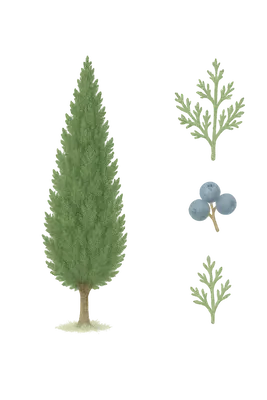Juniper (Tree)
Description
Juniper trees and shrubs (Juniperus species) are evergreen conifers in the cypress family (Cupressaceae). They have needle-like or scale-like leaves and distinctive blue-black berry-like structures that are actually modified fleshy cones. With about 70 species, junipers are among the most widespread conifers, found across North America, Europe, and Asia. They’re valued for their hardiness and adaptability to poor soils. Juniper berries are used to flavor gin and in traditional medicine.

Allergy Symptoms
Juniper pollen is a potent allergen that causes:
- Sneezing and runny or congested nose
- Itchy, watery, red eyes
- Coughing and throat irritation
- Asthma flare-ups and wheezing
Juniper pollen can travel hundreds of miles on wind currents, making it hard to escape during pollination season. There’s cross-reactivity with other Cupressaceae family members — cypress, cedar, and Japanese cedar — so if you’re sensitized to juniper, you may react to those too.
Typical Pollination Period
Juniper trees pollinate from late winter to early spring, with peak pollen release often between December and February in warmer regions. In parts of the southwestern United States, juniper pollen can be significant from December through March. Timing varies considerably by species and location.
Geographic Distribution
Juniper trees grow across the Northern Hemisphere:
- North America: Especially common in the Southwest (Texas, Arizona, New Mexico) and throughout western and eastern regions
- Europe: Found across the continent, especially in mountainous and Mediterranean regions
- Asia: Present in temperate areas of China, Japan, and Central Asia
Tips for Allergy Sufferers
- Check pollen forecasts and limit outdoor activities when counts are high
- Keep windows closed and use HEPA air purifiers
- Shower and change clothes after being outside
- Antihistamines or nasal corticosteroids can help — ask your doctor
- Watch for cross-reactions with cedar and cypress pollen
- For persistent symptoms, consider allergy testing or immunotherapy